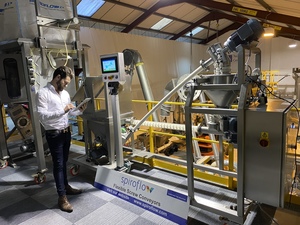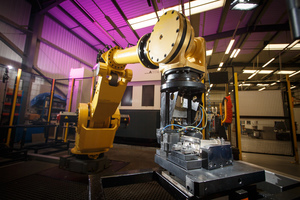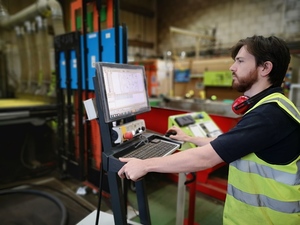

|
Edward Lowton
Editor |


|
| Home> | Handbooks | >Maintenance Management Guide | >Manufacturing's prosperity depends on digitalisation |
Manufacturing's prosperity depends on digitalisation
11 May 2023
AMID CURRENT headwinds such as rising energy prices, supply chain disruption and labour shortages putting pressure on manufacturers, businesses across the UK are looking to improve productivity and efficiency. In this context, the need for plant managers to know exactly how every machine across the factory floor is performing is more vital than ever and digitisation can play a key role, explains Iwona Kandpal, industrial digital technology specialist for the Made Smarter Adoption Programme in the North West
Earlier this year Made Smarter conducted a survey of SME manufacturers in the North West exploring the needs, motivations and behaviour towards digital technologies.
The findings made sober reading with 33% of businesses reporting a decline since the start of the pandemic. Micro and small businesses appear to have been particularly badly affected.
As a result, decision-makers said that their main focus in the here and now was survival and finding ways of increasing sales, while simultaneously improving productivity and efficiency.
What was particularly interesting was that adopting digital technologies as a way of mitigating these pressures was towards the bottom of their list of priorities. More surprising still was that two-thirds admitted their business strategy doesn’t include a plan for integrating digital technology.
Moreover the findings of the research are an alarm bell that five years on from the publication of the Made Smarter Review - which laid bare the urgent need for the sector to focus on leadership, innovation, adoption, and skills to unlock the UK’s productivity problem - too many manufacturers do not see digitalisation as the solution to so many of their challenges and a means of fully of capitalising on the opportunities that Industry 4.0 offers.
While the pandemic has left many SME manufacturers focused on survival or recovering to pre-pandemic levels, new challenges such as rising energy prices, supply chain disruption and labour shortages are putting manufacturers under more pressure than ever before to achieve more with less.
With these competing crosswinds, plant managers are now more reliant than ever on their machines and equipment to stay running. Underperforming or failing could spell disaster, resulting in service delays, unhappy customers, and productivity and income losses. In the current climate this worst-case scenario could be the straw that broke the camel's back.
How Industry 4.0 is changing maintenance
The need to know exactly how every machine across the factory floor is performing has never been as vital. For the last three and a half years the Made Smarter adoption programme in the North West has assessed the digital capabilities and readiness of hundreds of SME manufacturers and found that many are still reliant on reactive and preventative maintenance, and with manually monitoring equipment.
Fortunately, access to data - which is at the core of effective machine monitoring, control and analytics - is now at the fingertips of the workforce through relatively low-cost Industry 4.0 technologies such as Industrial IoT (Internet of Things) sensors. And this is laying the foundation to introduce analytics and Artificial Intelligence (AI), which are capable of warning of potential failures long before they may happen.
A good example testing the waters with sensor technology is Playdale Playgrounds, a Cumbrian playground equipment manufacturer.
With the support of Made Smarter, they have fixed sensors to a traditional drill to capture real-time performance and predictive maintenance data such as operating times, the number of cycles, motor loadings and temperatures, and vibration measurements. Then, a Brainbox system captures and processes the data for display on digital screens.
This data will be analysed to understand the savings from improved efficiencies, reduced down-time, tooling-spend and maintenance costs. It will then be replicated across its 10 production cells.
Improving machine uptime with condition monitoring
A more advanced example of sensor application is ELE Advanced Technologies (ELE), a Lancashire-based manufacturer of specialist components for the aerospace, power and automotive sectors.
In order to remain competitive and preserve their exceptional customer service, they looked to technology to ensure predictable process capability and reliability, and reduce machine downtime through unplanned reactive maintenance.
Working with Made Smarter, they invested in a bespoke machine condition monitoring solution. This involved sensors fitted to six business critical machines to record a variety of signals such as spindle load, coolant pressure, temperature, and motor load. The data is collected and analysed against a benchmark and automatically notifies the supervisor or maintenance team in advance of any major machine malfunction and lost production. Data captured from the machine is available on demand to production supervisors to perform any further analysis and diagnostics.
ELE forecasts that the technology will improve key machine uptime by 10%, reduce maintenance spend by 10%, and improve accuracy and reliability by 10%.
Leading the way in predictive maintenance
Then there are manufacturers like Spiroflow, a process equipment manufacturer also based in Lancashire, which is embedding predictive maintenance into the market.
With Made Smarter support it has developed a remote monitoring system using IIoT to capture real-time information on the performance of its complete machinery range.
For its customer it means an operator no longer needs to constantly monitor equipment or processes, and can be alerted of potential safety hazards before they arise. Constant insight into equipment performance and being made aware of maintenance schedules will eliminate costly and unnecessary downtime.
For Spiroflow, remote access to its customers’ equipment means engineers will be able to carry out diagnostics without the need to travel, which will significantly reduce travel time, cost, and emissions, and make its maintenance and repair service more efficient and productive.
Access to the data will also give Spiroflow insight into the predictive maintenance of its equipment., meaning it can stock the right spare parts and become more efficient. The data will also help Spiroflow understand its product range better and provide feedback into its research and design process.
For all three examples I have shared adopting a specific technology to tackle a challenge was part of their digitalisation strategy. Without this vital plan manufacturers risk wasting time and money investing in the wrong technology, in the wrong way, trying to catch up with the pack.
This is why Made Smarter developed a Digital Transformation Workshop - an innovative, streamlined process which uses a diagnostic of a manufacturer's products, services, processes and people to find practical solutions to overcome business challenges.
The bespoke process cuts through the jargon to demonstrate the steps required in order to achieve digitalisation. It has been designed in a way that requires minimal time investment for manufacturers to turn the actions into results, while still allowing participants to focus on the day-to-day operations of the business.
The result is an easy-to-use guide for decision-makers with recommended first steps, a technology roadmap with potential suppliers, and information about how to get further support from the Made Smarter Adoption programme. This includes support with a technology project to pilot ideas, a leadership programme designed to equip SME managers and directors with the strategic view and the skills needed to pursue smarter manufacturing, and other support to develop a highly skilled, flexible and productive workforces needed to capitalise on digital transformation.
The four-steps to success
In all our conversations with manufacturers, we advocate a holistic approach to digital transformation where every decision is qualified and quantified. This can be broken down into four key steps.
The first is to get impartial expert advice. Our approach is to identify technology with a purpose. For example, let’s say the aim is to reduce machine downtime, improve product quality, reduce maintenance costs or lead times. Perhaps the driver is to gain insight into legacy equipment or understand what is behind micro-stoppages, which are often missed by human monitoring and go unrecorded, but can add up to be a significant issue.
Understanding the purpose of why the data is being collected means technology can be adopted sustainably. It will also help you choose the scale of the project.
The second step is deciding which technology will collect the data. IIoT sensors, which record things like temperature, vibration, the trajectory of moving parts in machinery, flow rate, pressure and fluid levels, is one method. Process control systems, which host and analyse trend data from different sources such as IoT sensors, machines, robots and other manufacturing equipment, are another.
Solutions such as SCADA systems can visualise machine data in a user-friendly format helping people spot anomalies faster and make data-driven decisions.
Step three focuses on how and where that data is stored. Knowing the format in which the data is being collected from devices or systems is important because some machines are not compatible and if connected directly, could render the data unreadable. This is when it is best to get the help of system integrators, experts who can design and deploy fully-integrated industrial IT architecture.
Meanwhile, it is important to be aware that there are different methods of industrial data storage which play a crucial role as an enabling solution to successful analytics reports.
The fourth and final step is the analytics, and the gateway to using AI and machine learning technology such as Asset Managements or Predictive Maintenance systems, to spot trends in production and labour, correct maintenance and quality issues, minimise safety, business risk and operational downtime throughout their production.
Help for the hardest step
Data and analytics are central to the Fourth Industrial Revolution. This is why more than half of SME manufacturers we are supporting have recognised the importance of capturing the data from across their processes and are bringing it all together in one place to solve problems and recognise opportunities.
A shining example is cleaning product manufacturer Organica UK, based in Liverpool City Region. Since the Covid-19 pandemic, they experienced a growing demand for their products and needed to increase production capacity, and improve how they manage resources.
A first project used sensors to capture the volumes of ingredients going into and coming out of its blending tanks, the number of bottles being filled, capped and labelled on the filling lines, and the number of boxes on the packaging lines.
By introducing real-time machine monitoring and analytics, Organica was able to make data-driven decisions and increase productivity by 20%. The investment laid the foundations for a second project to adopt a bespoke, cloud-based ERP solution to improve how it keeps track of orders, production and stock.
This new oversight and control will make its production processes 25% more efficient, reducing energy consumption by 10% per ton of product and reducing waste by up to 20%. The future looks bright for Organica which has kick-started its digital transformation and has a digital roadmap to help guide the way.
Before the pandemic, many SME manufacturers struggled with the dual barriers of time and capital to start their digitalisation journeys. Now, given the additional economic challenges we face, those barriers could appear insurmountable. But I can assure you that is not the case. Survival, recovery, and future prosperity in manufacturing depend on digitalisation, and Made Smarter is here to offer a helping hand
- Made Smarter architect Alain Dilworth awarded MBE in New Year Honours
- Made Smarter creates 60 digital manufacturing leaders
- Made Smarter-backed engineering firm hails 'phenomenal' impact after smart factory success
- Strictly Come Dancing shoe maker keeping stars on their toes steps into next growth phase with Made Smarter
- Robotics and automation create manufacturing jobs
- Improving maintenance processes through MSIN partnerships
- £25m drive to confront turbulent manufacturing supply chains
- Digital spare parts: innovation to solve supply chain woes
- Data drives down equipment failure
- Collaboration key to powering forward digital manufacturing
- Healthy trucks, healthy site
- The Sound of Silence: Communicating with machines
- Inspection, test & monitoring: A choice of career development pathways
- Compressor efficiency: Specification matters
- Raising issues of concern
- Mattei explains why compressor maintenance is essential
- Maintec 2013: Innovation galore
- Co-Locations for Maintec 2014
- Maintaining strategies for success
- Considerations for machine tool maintenance





















